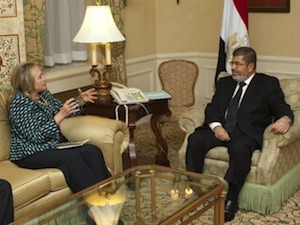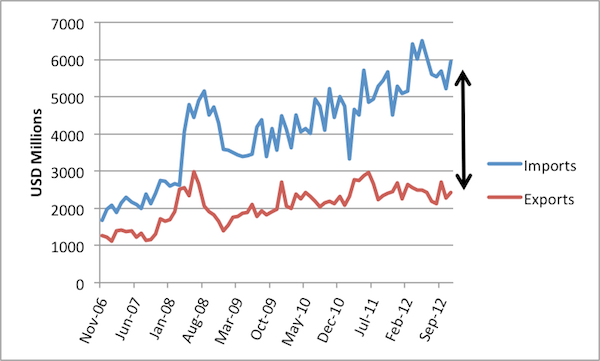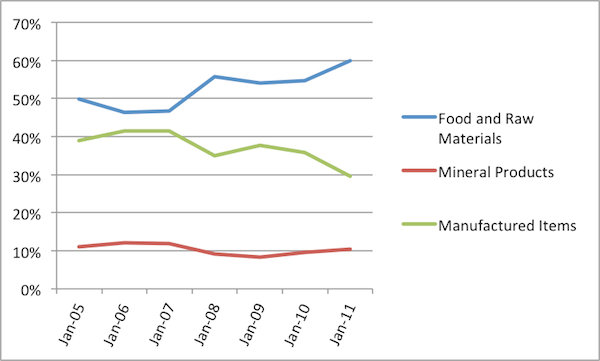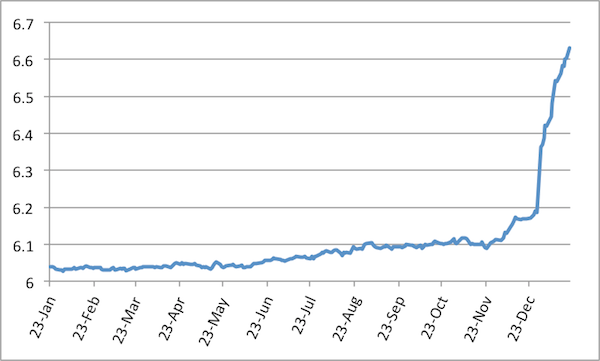Failure IS an Option in Egypt
By David P. Goldman
JINSA Fellow
By David P. Goldman
JINSA Fellow
 Synopsis: While it is relatively easy to find the right rhetoric for disengagement from Egypt, the fact of the matter is that the Obama administration has put all of its eggs in Egyptian President Mohammed Morsi’s basket. If the authority of the Morsi government were to fail, American planners would have to consider urgent alternatives to prevent the Egyptian crisis from destabilizing the whole region.
Synopsis: While it is relatively easy to find the right rhetoric for disengagement from Egypt, the fact of the matter is that the Obama administration has put all of its eggs in Egyptian President Mohammed Morsi’s basket. If the authority of the Morsi government were to fail, American planners would have to consider urgent alternatives to prevent the Egyptian crisis from destabilizing the whole region.
It is an axiom of the bi-partisan foreign policy consensus that failure in Egypt is not an option. America has invested nearly $60 billion in aid to Egypt since Egypt and Israel signed a peace treaty in 1977, and the Egyptian-American relationship has remained a pillar of U.S. foreign policy for nearly half a century. As Sen. John McCain said in a Jan. 17 statement on behalf of a Congressional delegation in Cairo,
Among our group here, Democrats and Republicans, there is plenty that we disagree about. But when it comes to Egypt, we largely speak with one voice. We all believe that what happens in Egypt will have a decisive impact on the future of this entire region. We all believe in the continued importance of the U.S.-Egypt relationship. We were all early supporters of the peaceful aspirations of the Egyptian people that inspired your revolution nearly two years ago – for democracy, for economic opportunity, for the protection of justice and human rights under the rule of law. And we have come to Cairo with one major message: For us in the United States, especially in the Congress, the promise of Egyptian revolution is the opportunity is has presented us to recast our relationship with Egypt – to make it a truly strategic partnership between our peoples, our nations, and our elected governments, not one that rests narrowly on one person or one party.
Little consideration has been given to an alternative hypothesis: that the Egyptian revolution expressed not democratic hopes, but rather incipient state failure due to decades of economic and social mismanagement, and that Egypt’s present crisis is not soluble by any mechanism available to American policy. A great deal of reporting (including by this writer) has drawn attention to the mechanics of Egypt’s present economic crisis. The deeper question is whether the Egyptian crisis is manageable to begin with. Egypt’s Minister of Defense, Abdul Fattah al-Sisi, raised the prospect of a collapse of the Egyptian state in a statement to a meeting of military students attended by senior officers and posted on the army’s website. Al-Sisi said:
The continuation of the struggle between political forces and their disagreement over the administration of the country may lead to the collapse of the state and threaten the future of upcoming generations.
After five days of deadly civil unrest and President Morsi’s declaration of a state of emergency, Egypt’s leading daily newspaper al-Ahram reported that shortages of bread and other essentials are driving the crisis in the streets:
On 25 and 28 January 2011, thousands chanted “Bread!” on streets across Egypt, highlighting the economic nature of the uprising. The chant represented the people’s aspirations for a fairer economic system, protesting high inflation rates, low wages and the unavailability of daily rations. It is no coincidence that bread was the first word of the revolution’s main slogan (“Bread, freedom, dignity”), as it is a daily staple for millions of people, making Egypt the largest per capita wheat consumer and importer.
“The demand for bread or daily rationing has been central to the Egyptian people’s economic and social demands since the 1977 bread uprising,” Khaled Ali, labour lawyer and ex-presidential candidate, told al-Ahram Online. “Food security is the Egyptians’ most basic right and the people’s struggle for enough to eat will continue,” explained Ali.
It has been two years now, and matters seem to be deteriorating rather than stabilising. Food protests have continued after the revolution with inflation reaching new peaks and basic necessities moving further out of reach for whole communities.
Exhibit 1: Egypt Imports and Exports

Exhibit 2: Egypt Imports by Major Category as Percentage of Total

From the data in Exhibits 1 and 2, we observe that Egypt’s import bill has tripled during the period 2006-2011, and that the main driver of the import bill has been food and raw materials. Food and raw materials have risen to 60 percent of total imports in 2011 from 50 percent in 2006, while manufactures imports have fallen to 30 percent in 2011 from 40 percent in 2006.
Egypt underwent a catastrophic reversal in its terms of trade since the mid-2000s, as illustrated by Exhibit 3.
Exhibit 3: Selected Price Indices for Major Commodities in Egyptian Trade

Since 2003, for example, the price of Egypt’s most important agricultural export crop, namely cotton, remained unchanged, while the price of its most important commodity imports, wheat and oil, doubled and tripled, respectively.
The high cost of essential imports translates directly into an unmanageable budget deficit through Egypt’s subsidy system. More than half of Egypt’s workforce is unemployed or underemployed, and almost half of the workforce (45 percent) is functionally illiterate. The government reports an unemployment rate of only 11 percent, but a very low denominator, namely the effective labor force, grossly distorts this number.
America counts three quarters of its population aged 15 to 64 in the active labor force, while Egypt only counts half its population in the active labor force. If Egypt’s labor force were measured the same way, the Egyptian unemployment rate would be about 40 percent and that does not count underemployment, which is endemic.
Sixty percent of Egyptians live in rural areas and are employed in agricultural and related activities. Their extremely low productivity reflects a longstanding policy of Egypt’s military governments since Nasser to keep as much of the population on the land as possible, to avoid the continued growth of Cairo as a megacity dominated by the unemployed and underemployed. A great deal of rural activity comprises disguised unemployment. Of the 10 million Egyptians of university age, moreover, nearly a third attends university, although only half graduate and very few obtain employment outside government make-work. That is another pool of disguised unemployment.
Egypt effectively supports an under- or unemployed population comprising half of its adult population. That is why its budget deficit is intractable: there simply is no means to assure the continued survival of a large part of its people without recourse to subsidies that have become increasingly expensive.
This population profile explains why Egypt’s trade deficit has exploded during the past several years, and why the government deficit has exploded along with it. As the cost of basic commodities (food and energy) rose along with global demand, the cost of importing these commodities and the cost of providing subsidies to the nearly-indigent half of the Egyptian population rose along with it.
Neither the military regime that succeeded Mubarak nor the Muslim Brotherhood government that replaced the military have been able to arrive at an agreement with the International Monetary Fund, which has offered a $4.8 billion loan on condition that Egypt reduce its budget deficit. Although there are considerable inefficiencies in Egypt’s subsidy system whose correction could in theory lead to substantial savings, the practical likelihood is negligible of achieving such savings without imposing extreme hardships on a population already living at the edge of survival.
That is why the Morsi government has adopted the least efficient means of conserving foreign exchange, devaluing the currency. Devaluation increases the cost of imported commodities and thus reduces consumption. Devaluation constitutes a de facto tax, benefiting debtors (mainly the government) at the expense of middle-class savers and consumers.
Exhibit 4: Egyptian Pounds per U.S. Dollar

Egypt’s trade deficit exploded to a remarkable 15 percent of GDP, or $42 billion per year. Egypt’s main foreign exchange earners apart from exports have been tourism, which peaked at $12 billion in 2010 and may fall to as little as $6 billion in 2013 by some Egyptian estimates, and the Suez Canal, which earns between $4 and $5 billion per year. Egyptians working abroad also send money home through remittances, which the World Bank estimated at $18 billion in 2010. It is impossible to know how much money Egyptians are sending home at the moment. Egypt has lost $20 billion in foreign exchange reserves since the fall of Hosni Mubarak in early 2011; how much of that reflects flight capital, and how much reflects financing of essential imports is impossible to judge from the available data.
Even under the most favorable circumstances conceivable, Egypt is in no position to absorb large amounts of foreign investment. It has neither the infrastructure nor the labor force to make use of investment. As a rough indicator of the primitive state of the country’s capital markets, the capitalization of Egypt’s stock exchange is roughly $500 per capita, compared to $50,000 per capita in the United States.
The accumulated errors of past Egyptian governments simply are too big for the West to manage within acceptable parameters. Egypt’s external financing needs are impossible to estimate, because the main unknown is the volume of remittances that Egyptians working abroad send home to their families. The exploding trade deficit and shrinking tourism numbers, though, suggest that the financing requirement will be closer to $20 billion a year than to $10 billion a year, over multiple years. Bloomberg News Jan. 24 estimated that the country’s external financing requirement would reach $22 billion in 2013. Egypt’s deficits are structural rather than cyclical. Given budget constraints in all Western countries, and the undisguised hostility of the Gulf States to the Muslim Brotherhood, it seems fanciful to imagine that Egypt’s donors will find $50 or $60 billion to support the Cairo regime over the next three years.
One way for American policymakers to abnegate responsibility for Egypt is to put the onus on the Egyptian government. In effect, Egypt’s donors are asking Egypt to undertake extremely painful austerity measures by democratic means, requiring Egyptian voters to accept extreme privation voluntarily. If the United States holds Egypt to a high standard of democratic practice, the Morsi government is likely to fail the test, and give America a good reason to distance itself from Egypt’s problems.
As Sen. McCain declared in Cairo Jan. 17, “America’s ability to continue our partnership with Egypt, to maintain our assistance to Egypt, to get greater American and foreign investment into Egypt, and to build international support for Egypt – all of this ultimately depends on the progress of democracy in Egypt. Not just the outcome of elections, or the election of one person or group or another, but on the construction of an inclusive political system, based on the rule of law, that respects the rights of all Egyptian citizens, reforms and grows the Egyptian economy, and upholds Egypt’s international agreements.”
American planners need to develop contingencies if Egypt becomes a failed state. Providing upgraded F-16s fighter jets and M-1 Abrams tanks to Egypt does not seem an appropriate step at this juncture. In the event that Gen. al-Sisi’s warnings were to be realized, the risk of internal conflicts spilling across Egypt’s borders would become an urgent concern for the United States. The effects of an Egypt state failure might include:
-
The departure of large numbers of economic refugees departing for southern Europe;
-
Destabilization of Egypt’s borders with Sudan and Libya;
-
The acquisition of sophisticated Egyptian armed forces weapons by terrorists in Gaza or the Sinai;
-
Closure of the Suez Canal; and
-
Agitation among the more than two million Egyptian foreign workers in Jordan and the Gulf States.
While it is relatively easy to find the right rhetoric for disengagement from Egypt, the fact of the matter is that the Obama administration has put all of its eggs in Mohammed Morsi’s basket. If the authority of the Morsi government were to fail, American planners would have to consider urgent alternatives to prevent the Egyptian crisis from destabilizing the whole region. We will address this issue in more detail shortly.
David P. Goldman, JINSA Fellow, writes the “Spengler” column for Asia Times Online and the “Spengler” blog at PJ Media. He is also a columnist at Tablet, and contributes frequently to numerous other publications. For more information on the JINSA Fellowship program, click here. For more information on the JINSA Fellowship program, click here.